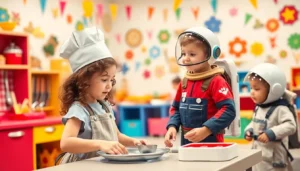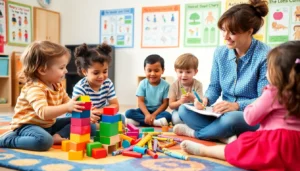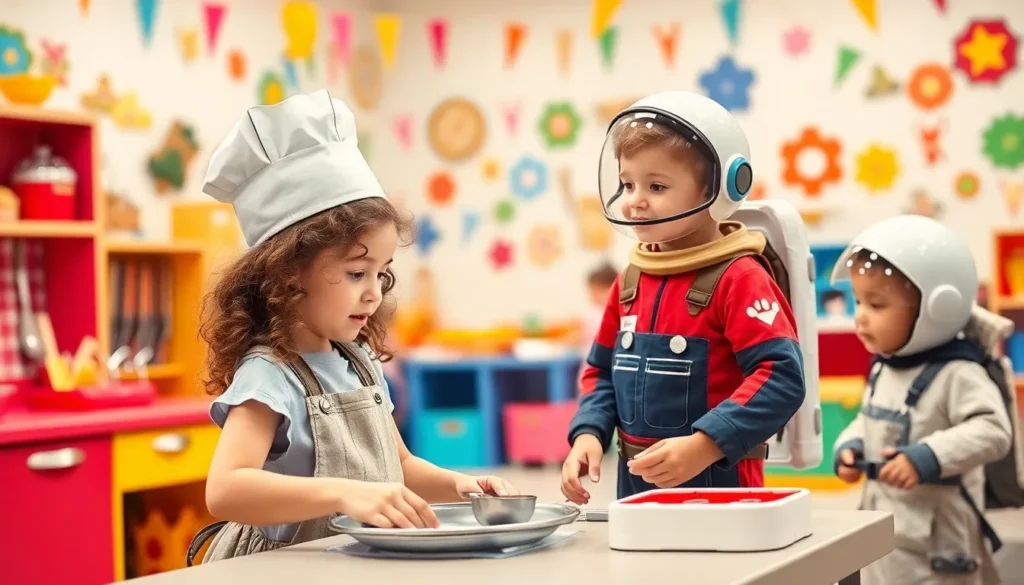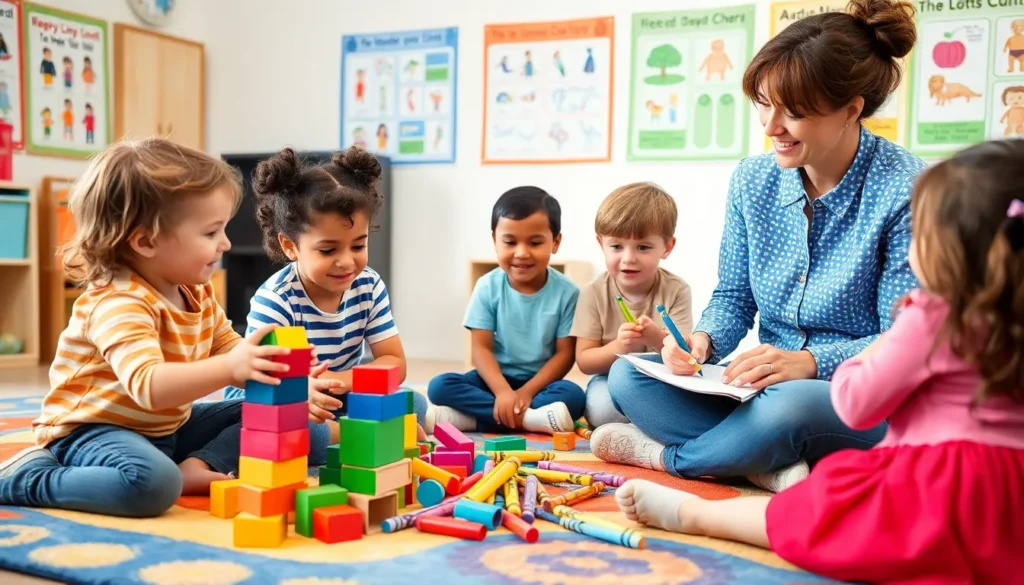Table of Contents
ToggleIn the whimsical world of early childhood, where crayons reign supreme and snack time is a sacred ritual, play-based learning emerges as the unsung hero. It’s not just about finger painting and building block towers; it’s about laying the foundation for critical thinking, creativity, and social skills. Who knew that a game of pretend could be the secret sauce to developing future leaders?
Importance Of Play Based Learning In Early Childhood
Play-based learning significantly impacts early childhood education by promoting holistic development. Cognitive skills flourish through activities where children explore, experiment, and create. Physical skills improve as children manipulate toys, run, and engage in group activities.
Social skills enhance during shared play experiences. Children learn teamwork, communication, and problem-solving while interacting with peers. Imaginative play inspires creativity, allowing kids to express themselves in various ways.
Emotional well-being benefits from this type of learning as it provides a safe space for children to navigate their feelings. They can practice empathy and resilience when facing challenges in a playful context. Research from the National Association for the Education of Young Children suggests that play fosters emotional intelligence, critical for lifelong success.
Furthermore, play-based learning contributes to language development. Through play, children engage in dialogue, practice vocabulary, and improve language skills. Interaction with others creates opportunities for rich conversations, enhancing comprehension and communication abilities.
Regular participation in play-based activities helps prepare children for future academic pursuits. Skills they develop, such as critical thinking and problem-solving, lay the groundwork for learning in school settings. Organizations like UNESCO emphasize the importance of incorporating play in educational strategies to boost engagement and retention of knowledge.
Play-based learning serves as a fundamental approach in early childhood education, offering a pathway for developing various essential skills. It creates an environment where children thrive, setting the stage for future success.
Benefits Of Play Based Learning
Play-based learning offers numerous advantages for early childhood development. It fosters an environment where children explore, create, and connect, enhancing their overall growth in various dimensions.
Cognitive Development
Cognitive development flourishes through play-based learning experiences. Children engage in problem-solving tasks that stimulate their critical thinking skills. Active participation in play encourages exploration, leading to a deeper understanding of concepts. By manipulating objects and experimenting with different scenarios, they enhance their reasoning abilities. Learning through play supports early literacy, as children develop language skills by communicating during their activities. Evidence shows that playful approaches improve memory retention and academic performance in later stages of education. Additionally, children gain confidence in their cognitive abilities, which promotes a lifelong love for learning.
Social Skills Enhancement
Social skills emerge organically in play-based learning settings. Children collaborate during group play, sharing ideas and negotiating roles. These interactions teach them vital communication skills and emotional intelligence. Lessons in empathy arise as children learn to understand their peers’ feelings during play. Engaging in cooperative play fosters teamwork and a sense of belonging while developing conflict resolution strategies. Research highlights that children who participate in play-based activities exhibit stronger relationships with their peers. Overall, such interactions build essential social competencies that benefit children throughout their educational journey and beyond.
Types Of Play In Early Childhood
Various types of play contribute significantly to children’s development during early childhood. Each type serves a distinct purpose and fosters different skills, enhancing their overall learning experience.
Free Play
Free play provides children with the freedom to explore their interests without structured guidance. They engage in activities of their choice, allowing for imaginative scenarios. This type of play encourages creativity, critical thinking, and self-regulation, as children navigate their environments independently. Social skills often flourish through free play, as children learn to work together, negotiate rules, and resolve conflicts. Open-ended materials like blocks, art supplies, and natural elements facilitate exploration. Therefore, free play lays a crucial foundation for emotional resilience and problem-solving abilities.
Guided Play
Guided play involves adults in the children’s play environment, fostering specific learning objectives while still allowing exploration. Educators or caregivers create enriching experiences that promote skill development in a supported context. This approach balances child-led exploration with adult guidance, enhancing cognitive and social skills. Adults may pose questions, suggest challenges, or provide resources that complement children’s interests. Research highlights that guided play can improve language development and enhance critical thinking. Consequently, this type of play effectively combines structured learning with the joyful aspects of play.
Implementing Play Based Learning In Classrooms
Implementing play-based learning in classrooms involves intentional strategies that integrate play throughout various subjects.
Curriculum Integration
Integrating play-based learning into the curriculum enriches educational experiences. Teachers can design activities that connect play with academic objectives, such as using storytelling to enhance literacy skills. Math concepts may emerge through games that involve counting with blocks or measuring ingredients for a cooking project. Incorporating outdoor play connects physical activity with learning about nature and science. Structured themes, like community helpers, allow children to explore roles through role-play while practicing social skills. These approaches ensure that play becomes a vehicle for deeper learning, engaging diverse learners and catering to various developmental needs.
Role Of Educators
Educators play a crucial role in facilitating play-based learning experiences. Observing children’s play helps them understand interests, strengths, and areas for growth. They can use this insight to create targeted play-based activities that foster cognitive, social, and emotional development. Guiding play relies on providing just enough structure, allowing children to explore while embedding educational objectives. Encouraging collaboration among peers promotes discussions that enhance language development. Building relationships through playful interactions fosters a sense of belonging and safety, crucial for emotional well-being. Ultimately, educators act as facilitators, enriching children’s learning environments through deliberate engagement in play.
Challenges And Considerations
Implementing play-based learning presents several challenges that educators must navigate. Limited resources can hinder the availability of suitable materials for effective play. Educators require adequate training to understand how to facilitate play-based learning environments properly.
Classroom dynamics often present obstacles, especially in settings with diverse learning needs. Balancing different developmental stages while ensuring all children are engaged in meaningful play poses difficulties. Additionally, some stakeholders may prioritize academic outcomes over play, complicating the integration of play-based approaches into the curriculum.
Time constraints also affect educators. Traditional schedules may not allow sufficient periods for unstructured play, limiting opportunities for exploration and creativity. Resistance from parents or school administration can further challenge this approach; some may question its effectiveness compared to conventional methods.
Assessment methods become an additional consideration. Measuring the impact of play-based learning on development remains complex. Standardized testing often does not capture the skills acquired through play, making it tricky to evaluate children’s progress accurately.
Furthermore, educators must remain mindful of safety during play. Managing physical risks and ensuring emotional safety requires constant attention. Teachers build trusting relationships to create a secure environment for children to explore freely.
Successful integration of play-based learning demands careful planning and persistent advocacy. Effective communication with parents about its benefits helps alleviate concerns. Educators need to collaborate with peers to design innovative play-based activities that meet educational standards while fostering holistic development.
Play-based learning is a cornerstone of early childhood education that shapes well-rounded individuals. It nurtures critical skills that children will carry into their futures. By engaging in play, children not only develop cognitively but also enhance their social and emotional competencies. This holistic approach fosters creativity and problem-solving abilities essential for lifelong learning.
Educators play a vital role in facilitating this type of learning, ensuring that children have access to enriching play experiences. Despite challenges in implementation, the benefits of integrating play into educational settings are undeniable. Prioritizing play-based learning can transform classrooms into vibrant environments where children thrive and prepare for the complexities of the world ahead.










